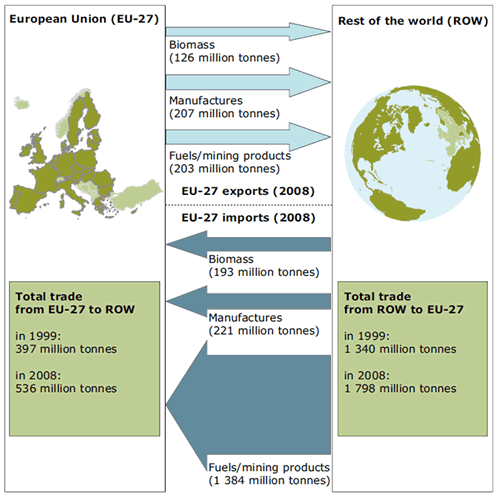Shortsighted EU policy on raw materials delays getting to Zero Waste
The EU is the region most dependent on foreign imports of raw materials in the world. Hence there is a genuine interest in reducing this dependency. But, are the current policies appropriate to create a close loop society in the EU? How can the Zero Waste concept contribute to this aim?
 The high EU dependency on raw materials pushed the the European Commission (2008) to launch a major new strategy, the Raw Materials Initiative (RMI). It consisted of three pillars:
The high EU dependency on raw materials pushed the the European Commission (2008) to launch a major new strategy, the Raw Materials Initiative (RMI). It consisted of three pillars:
1- securing access to raw materials on world markets,
2- fostering the supply of raw materials from European sources
3- and reducing the EU’s own consumption of primary raw materials.
During this year the European Parliament has been working on the new RMI under lots of pressure from the industry. From the Zero Waste point of view, that would like to see all the materials entering the Union being reintroduced into the production cycle over and over (craddle-to-craddle approach), we see the policy of the EU regarding this RMI being rather shortsighted. The new RMI puts all the energy on pillars one and two, on using diplomatic and less-diplomatic means to obtain raw materials in a way that very often undermines the capacity of the global south to develop its own industry . As it stands right now the main driver of the RMI is free-trade with all its consequences, unfortunately the text contains no real means to reduce consumption of these raw materials in the EU (the EU consumes 3 times more materials than Asia and 4 times more than Africa) and no means to close the material gap that would allow the EU to increase its sustainability.
In other words, in the RMI there is almost no reference to recycling as a way to recover materials. Despite the usual nice rhetoric about sustainability and the EU becoming a “recycling society” the current policy continues to be to import materials, use them to the full and let the poor and the other parts of the world deal with the waste. In the current RMI there are neither targets nor aims to measure the material flows from and to the EU. Without knowing what comes in and what comes out it is impossible to consider recycling targets as a way to recover these materials and hence reduce this dependency from abroad.
Oxfam and Traidcraft produced a good analysis of the RMI in which they rightly argue that the first priority for the EU should be to reduce its consumption of resources and move towards a low-resource economic model. This is exactly what a Zero Waste model would be; make waste disappear by making it possible to materially recover all the materials that enter the EU.
Times have changed and pursuing old-fashioned strategies based on resource extraction and peer-pressure to impoverished countries will not work any more. Although ‘resource intensity’ (the amount of raw materials needed to produce growth) is declining globally, the absolute amount of natural resources extracted every year is increasing due to economic growth – the world extracts around 50 per cent more natural resources now than in 1980. This means that more scarce resources will get more expensive and unreachable and trying to close the loop only makes sense. Any EU policy on materials and resources that doesn’t include maximising material recovery and resource efficiency is compromising the economic future of the Union. The vote in the European Parliament’s Industry Committee against resource efficiency targets is a worrying sign that can hijack the future of the EU resource efficiency strategy.
The RMI should focus a lot more on material productivity and on how to recover the materials that are already in the EU and which will end up dumped, burned or exported. A Zero Waste strategy would allow to recover these materials. In fact, most Zero Waste municipalities in Europe almost don’t send any of these precious materials to disposal.Any EU policy on materials and resources that doesn’t include maximising material recovery and resource efficiency is compromising the economic future of the Union.